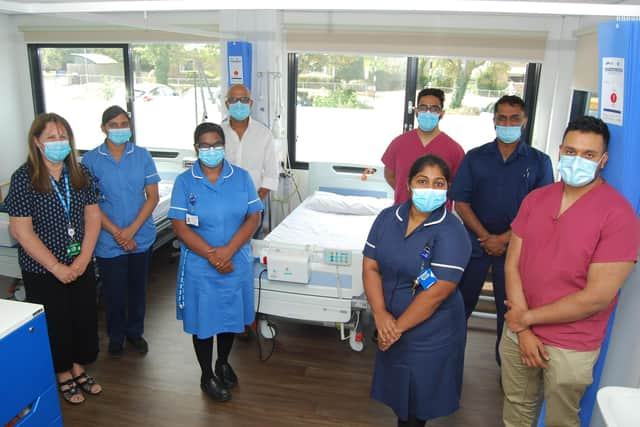Doctors continue fight against Covid as number of virus deaths at Kettering General Hospital nears 800
and live on Freeview channel 276
Specialist hospital teams are continuing the fight against Covid-19 by offering potentially life-saving medication to some of the most vulnerable people in Northamptonshire.
Staff at Kettering General Hospital have provided treatments, either as tablets or intravenous infusions, as part of a national network of Covid Medicines Delivery Units (CDMUs) set up in December 2021.
Advertisement
Hide AdAdvertisement
Hide AdThe county’s CMDU triage hub at Northampton General Hospital screens and contacts Covid-positive patients with underlying health conditions and is run by a dedicated team of four urgent care physician associates — qualified healthcare professionals working alongside doctors — prescribing antivirals or neutralising monoclonal antibody medications at both hospitals.


Consultant physician and chief of medicine, Dr Kish Patel, oversees the CMDU at Kettering.
He said: “At KGH, following triage by the team at NGH, each patient is contacted by phone to plan their treatment.
“We have a dedicated team based on Sir Thomas Moore ward that is able to deliver infusions seven-days-a-week.
Advertisement
Hide AdAdvertisement
Hide Ad“Our team has done a great job supporting and reassuring patients who can often be very anxious after contracting Covid on top of their underlying conditions.
“We are very proud to have supported the CMDUs as an important additional form of support for the most vulnerable patients in Northamptonshire.”
Underlying health conditions can include people with multiple sclerosis, motor neurone disease, cancer, kidney or liver disease, immune deficiencies, or patients taking long-term immune system suppressing medications for certain conditions.
Having these conditions puts patients at greater risk from Covid-19 but the specialist treatments are known to be up to 89 per cent effective at preventing more serious illness and hospitalisation if taken within seven days of onset of symptoms.
Advertisement
Hide AdAdvertisement
Hide AdDespite a fall in reported Covid cases recently, latest NHS England figures revealed 18 Covid patients died in Northamptonshire’s two main NHS hospitals in the week to Wednesday (August 17) — the highest weekly number since April.
At NGH, official figures show 986 Covid patients have sadly died since the pandemic began in March 2020 while KGH has seen another 767 deaths. More than 300 of the 1,753 total deaths have occurred this year.
A Physician Associates spokesman added: “Vaccination offers a degree of protection for patient in high-risk groups but they still remain vulnerable, in particular to new Covid-19 variants.
“Many of the highest risk patients will have received a letter from the NHS telling them they may be eligible for these treatments in the event they test positive.
Advertisement
Hide AdAdvertisement
Hide Ad“They will receive PCR or LFT tests to keep at home in case they develop symptoms and if they test positive they are asked to upload results onto the gov.uk website.
“Positive patients are then flagged electronically to our team at NGH.
“We call all patients to assess how they are coping with Covid and if they are not improving, and they are within seven-days of onset of symptoms, we may offer them antivirals or neutralising monoclonal antibody treatment.
“Depending on their condition and the medications they are on, that will mean a relative picking up oral tablets from the hospital pharmacy at either Northampton or Kettering general hospitals or going into those hospitals to have an intravenous infusion in dedicated rooms.”
